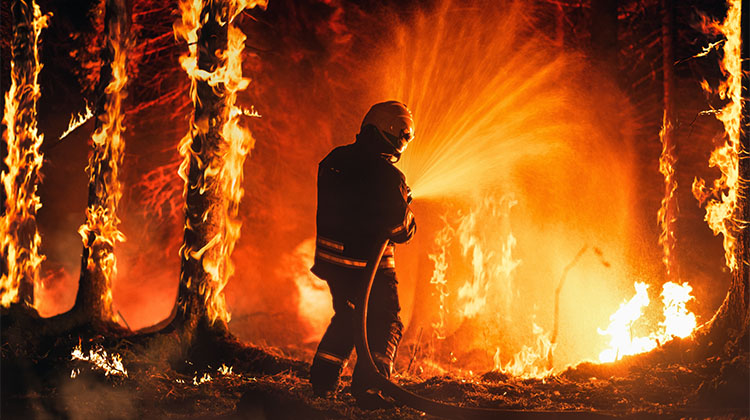
World War II concluded with the deployment of two nuclear weapons on Japan in 1945. But the use of those weapons jump-started another war—the Cold War—that lasted from 1947 to 1991 (the fall of the Soviet Union). As the world's two major powers, the United States and the Soviet Union, expanded their nuclear weapons capabilities, the fear of MAD—Mutual Assured Destruction—created a bunker mentality. If the missiles ever started flying, both nations would be destroyed.
From the national government to private citizens, steps were taken to create fallout shelters for protection from a nuclear blast. For example, in White Sulphur Springs, West Virginia, at the famous Greenbrier Resort an underground bunker was secretly constructed large enough to protect Congress from a nuclear explosion. Construction began on the bunker during the 1950s and was kept in a state of readiness for thirty years, though thankfully never used. The bunker's existence was never even acknowledged by the government until 1992 when it was decommissioned.
At the personal level, thousands of American families dug fortified fallout shelters on their properties and kept them stocked with food, water, and other supplies during the Cold War. At the community level, citizens grew used to seeing yellow and black FALLOUT SHELTER signs at the entrances to underground spaces deemed safe against nuclear explosions.
While the Cold War is over, a different kind of bunker mentality is on the rise today. The so-called "prepper" movement encourages people to be prepared for whatever threats may arise. And many wealthy people are building luxurious bunkers in far-flung locations to protect themselves from the threats of climate change, pandemics, nuclear war, or other threats not yet imagined.
Let me be clear: No one would argue against the wisdom of planning, looking ahead, and being prepared. Countless lives have been saved thanks to preparedness when it comes to natural disasters.
But with Cold War bunkers as a backdrop, in this article I want us to think about a different kind of bunker mentality that runs counter to our calling as Christians: retreating and protecting ourselves from whatever "mess" the world finds itself in at any given time.
I'll be the first to admit: Retreating is a natural instinct. It's why we jerk our hand back after touching a hot pan on the stove. It's why we retreat indoors when a flash of lightning cracks overhead. And it's why we take a seat on the other side of the doctor's waiting room away from the person who is hacking and sneezing. Self-preservation is a natural first response.
Self-preservation is a natural first response.
But consider what those we refer to as first responders do when it comes to threatening situations: police, fire fighters, search and rescue teams, EMS personnel, and, of course, our military, and many unnamed civilian citizens as well. The example that first comes to mind is when 9/11 happened—the terrorist attack on the World Trade Center in lower Manhattan. As thousands of citizens were running away from the burning and falling towers (understandably so), hundreds of police officers, fire fighters, and EMS personnel were streaming toward the danger zone. And many never returned home.
To this day, we marvel at their boldness and bravery. But they prove my point. While retreating may be a natural first response, it is possible to go toward the point of greatest need. It's the difference between a natural response and a supernatural response (to put it in biblical, spiritual terms).
We may not wake up each day sensing an immediate threat from nuclear war or rising sea levels or anarchists on our doorstep, but we do sense threats of other kinds that tempt us to retreat into our own safe spaces—to roll up the welcome mat on our front porch and turn off the porch light.
While there may be many aspects of life that we find threatening, I want to suggest the one I believe is most contrary to our Christian calling: the fear of those who are not like us. As societies become more and more pluralistic and diverse, we sometimes think we've woken up in a different culture. We find the world has come to our community, our church, our neighborhood, our doorstep, and even our family.
When that happens, we are tempted to retreat back behind the walls that isolate us from the unfamiliar, from what we don't understand. But that is exactly the opposite of what we have been called to do! Jesus sends us into the world to share His love and salvation with every person, not live in a "holy huddle" with those who believe, look, and act like us. When you think about it, instead of us having to go into the world to evangelize, God is bringing the world to us!
But it's not just cultural differences that intimidate us. Even among those who are culturally like us, there are people whose lives may seem "messy" to us: family problems, financial problems, lifestyle problems, and more. What we tend to forget is what Paul told the Corinthians: "And such were some of you. But you were washed, but you were sanctified, but you were justified in the name of the Lord Jesus and by the Spirit of our God" (1 Corinthians 6:11). The Corinthians were a "messy" bunch (verses 9-10) before they met Jesus Christ, and such were some of us. Thankfully, somebody can1e toward us with the Gospel instead of retreating away from us and our dysfunctions.
Nowhere in the Bible does it say we are not to approach any class or category of people with the Gospel. Instead, we are to be moving forward into the world—moving towards, not away from, the points of greatest need. Like the first responders I just described, we need boldness: a bold moment, a bold mission, and a bold message.
We are to be moving forward into the world moving towards, not away from, the points of greatest need.
A Bold Moment
Everything happens in a moment of time. Nothing happens until we take action—even if that action is prayer. When we encounter a situation in which we know the Gospel of Christ could bring about change, we need to have an "Esther Moment": ''Yet who knows whether you have come to [this situation] for such a time as this?" (Esther 4:14) It's the question first responders have to ask daily: If not me, who? If not now, when?
Your response may be to pray for boldness, for guidance, or for wisdom. Or it may be to deliver a meal or a welcoming gift. Or it may be to intervene with an offer to help in a personal way. Or, at a different level, you may decide to run for public office in order to bring biblical values into the public square.
Whatever else the situation demands, it will first require a bold moment.
A Bold Mission
Few people are in a position to change the whole world—but all of us are in a position to change one life. Think about this: It is estimated that there are more than six hundred million evangelical Christians in the world—those who believe in the necessity of personal salvation through Jesus Christ. If all six hundred million of us touched just one life with the Gospel of salvation, think how that would impact the world! And many of us are in a position to touch more than one.
The Church's mission is to change the world. But your mission and mine is to touch the lives of those whom God puts in our path. Ask God for the boldness to fulfill His mission for you.
If all six hundred million of us touched just one life with the Gospel of salvation, think how that would impact the world!
A Bold Message
Perhaps the most intimidating part of our mission is to tell people that they must be saved through faith in Jesus Christ. But that is the biblical message! And it takes boldness on our part not to retreat from verbalizing that message. Yes, we must share Christ with gentleness, respect, and understanding. But we must not shy away from speaking the truth in love.
When Christ sent His apostles into the world, He promised them the power of the Holy Spirit (Acts 1:8). If we rely on that same Spirit and same power; we will have the words to speak and the boldness to speak the Gospel message.
Let us not have a bunker mentality when it comes to facing life in a challenging world. Let us have the same mentality that Christ had—to seek and to save the lost.
This article was first published in the October 2024 issue of Turning Points Magazine & Devotional. Request your complimentary subscription today!
Thank You
Your complimentary Revelation Prophecy Chart is being prepared for shipment! If you have any questions about your order, contact us at:
(877) 998-0222 or info@davidjeremiah.org

